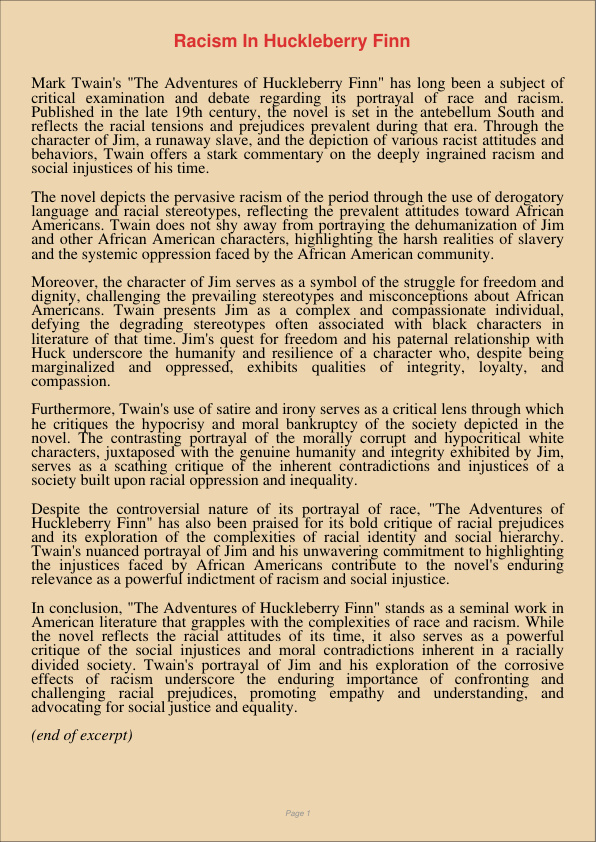Racism In Huckleberry Finn
Jan 8, 2024
huckleberry finn
racism
Law
Other
Mark Twain’s “The Adventures of Huckleberry Finn” has long been a subject of critical examination and debate regarding its portrayal of race and racism. Published in the late 19th century, the novel is set in the antebellum South and reflects the racial tensions and prejudices prevalent during that era. Through the character of Jim, a runaway slave, and the depiction of various racist attitudes and behaviors, Twain offers a stark commentary on the deeply ingrained racism and social injustices of his time.
The novel depicts the pervasive racism of the period through the use of derogatory language and racial stereotypes, reflecting the prevalent attitudes toward African Americans. Twain does not shy away from portraying the dehumanization of Jim and other African American characters, highlighting the harsh realities of slavery and the systemic oppression faced by the African American community.
Moreover, the character of Jim serves as a symbol of the struggle for freedom and dignity, challenging the prevailing stereotypes and misconceptions about African Americans. Twain presents Jim as a complex and compassionate individual, defying the degrading stereotypes often associated with black characters in literature of that time. Jim’s quest for freedom and his paternal relationship with Huck underscore the humanity and resilience of a character who, despite being marginalized and oppressed, exhibits qualities of integrity, loyalty, and compassion.
Furthermore, Twain’s use of satire and irony serves as a critical lens through which he critiques the hypocrisy and moral bankruptcy of the society depicted in the novel. The contrasting portrayal of the morally corrupt and hypocritical white characters, juxtaposed with the genuine humanity and integrity exhibited by Jim, serves as a scathing critique of the inherent contradictions and injustices of a society built upon racial oppression and inequality.
Despite the controversial nature of its portrayal of race, “The Adventures of Huckleberry Finn” has also been praised for its bold critique of racial prejudices and its exploration of the complexities of racial identity and social hierarchy. Twain’s nuanced portrayal of Jim and his unwavering commitment to highlighting the injustices faced by African Americans contribute to the novel’s enduring relevance as a powerful indictment of racism and social injustice.
In conclusion, “The Adventures of Huckleberry Finn” stands as a seminal work in American literature that grapples with the complexities of race and racism. While the novel reflects the racial attitudes of its time, it also serves as a powerful critique of the social injustices and moral contradictions inherent in a racially divided society. Twain’s portrayal of Jim and his exploration of the corrosive effects of racism underscore the enduring importance of confronting and challenging racial prejudices, promoting empathy and understanding, and advocating for social justice and equality.
